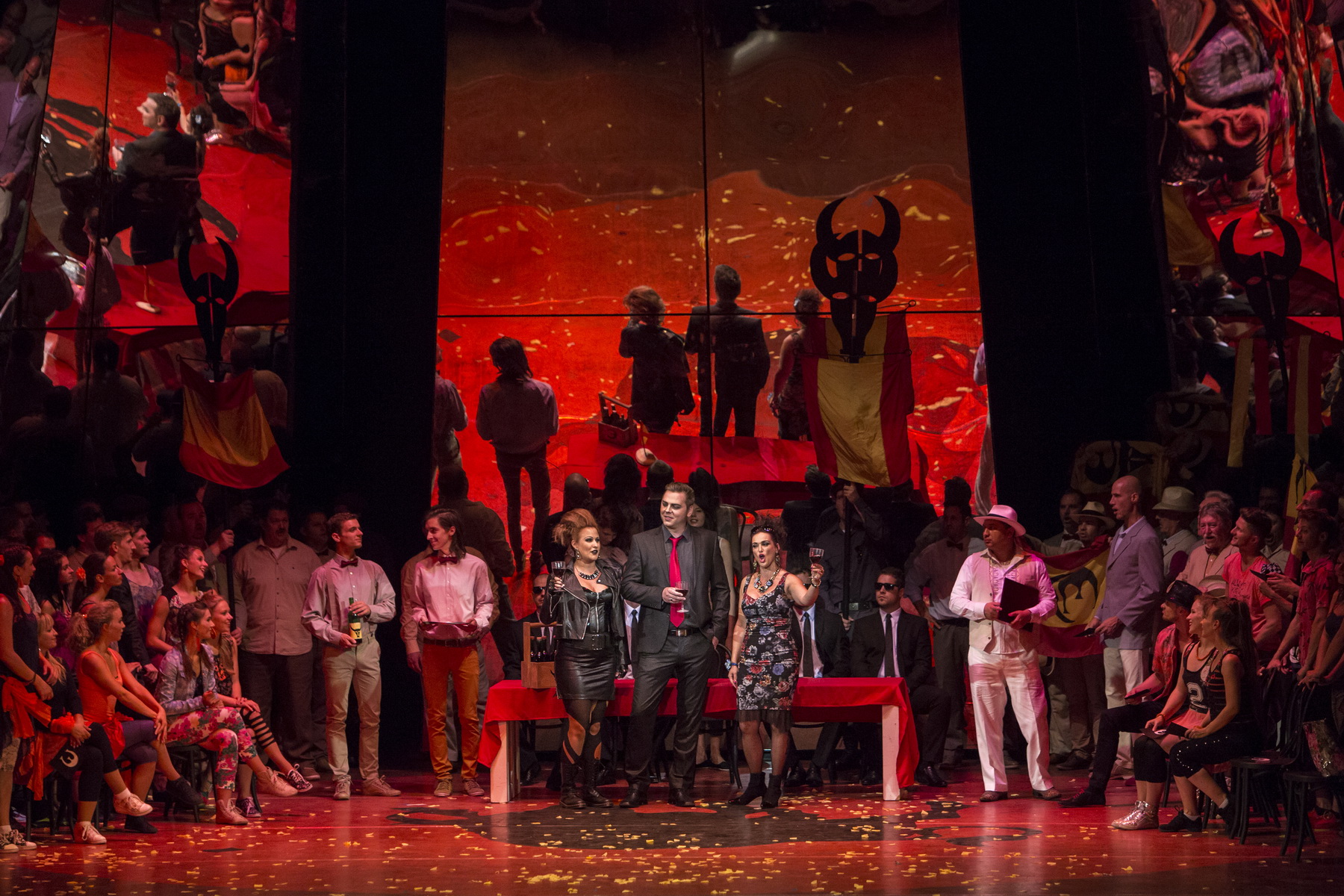TINSELTOWN TIDBITS . . . BIZET'S CARMEN AT THE ERKEL IN BUDAPEST Beloved Opera Sparks Exciting Modern Presentation by Bonnie Carroll (4).jpg)
Atala Schöck and Attila B. Kiss give an unforgettable performance in the Erkel State Opera’s Carmen. (Photo: Zsófia Pályi) It was a standing ovation for the recent performance of Bizet's Opera Carmen at the Erkel Theatre in Budapest. The performances given, along with the supporting performances had the audience spellbound. The conductor István Dénesand and the symphony perfectly performed the beloved opera, while the cast were spotlighted in a completely modern and exciting visual on stage that included exceptional set and costume designs. Carmen at the Erkel changed the opera’s spoken French prose to Hungarian, with the arias remaining the same. The production of Carmen at the Erkel, directed by Pál Oberfrank, whom I felt encouraged some unusual human sensitivities to certain characters I've not seen before in versions of this classic opera such as the scene where Micaëla's attempts to give comfort to Carmen. The story is set in modern times with costumes that included Carmen wearing a leather jacket and red patent high heels. The dance sequence during Act II was an amazing Michael Jackson touch, and the audience was completely mesmerized by the outstanding combined opera elements emerging before their eyes on stage. 
Tenor Attila B. Kiss gave a strong and believable performance as Don José, while Károly Szemerédy’s Escamillo was also a consistently fine performance. I found the mirrored stage back allowing the audience to view Conductor István Dénes during the performance an ingenious and magical touch. .jpg)
Singing the title role of Carmen was mezzo-soprano Atala Schöck, who was a natural for this role in every way. I absolutely loved her amazing performance and felt her smoky voice and sultry mannerisms were the glue that tied the whole opera story line together perfectly. The Act III aria by Zita Váradi’s Micaëla was also very well done and quite moving. I saw the synchronized dance number with silver umbrellas, choreographed by Marianna Venekei, as totally fascinating, and I found myself thinking of Georges Seurat's A Sunday Afternoon on La Grande Jatte, while the solders on stage, who had the costumed appearance of all being relatives of Che Guevara was also an interesting choice. I felt the use of smoke machines for effect was an unnecessary distraction. What was inspiring to me was the median age in the theatre for the evening Carmen performance, which was about twenty-three, with many young children and teens with their parents in attendance. I've never seen so many young people at an Opera, and I feel the work being done by the Erkel Opera is the reason. Obviously, the right visuals will attract young people and this is key to making these brilliant classics become familiar to our youth. 
The Erkel opened in 1911 and is Hungary’s largest theatre building. Its history is intertwined with the golden age of Hungarian opera performance, with such luminaries as Luciano Pavarotti, Placido Domingo, Éva Marton and Grace Bumbry all having graced the stage of a building whose acoustics are considered the stuff of opera legend. The Erkel was renovated to become a second performance space for the Hungarian State Opera in 1951. After being closed in 2007 the Hungarian government provided 1.7 billion forints in grants for the renewal of the Erkel Theatre. It hosts about half of the company’s productions, with the other half held in the historic Operaház, a grander but far smaller venue. .jpg)
Audiences now step into an auditorium with a completely new look, while every effort was made to ensure that the building's fantastic acoustic properties remained unchanged. Although the number of seats has been reduced from 1,935 to 1,819 by refitting the rows of seats for more comfort, the theatre nevertheless retains its rank as the highest capacity theatre in Hungary – and in Eastern Central Europe. The Erkel is considered “the people's opera house” and usually stages the more popular operas in their repertory. Performances are casual by Hungarian standards. I found it refreshing that their lowest priced tickets are available for the equivalent of about five US dollars. The exceptional artistic work being done at the Erkel is a real credit to the State, and their agenda is clearly focused on creating and presenting performances that are attracting the Hungarian youth to experience the sacred classics of the past that are being presented with casual and modern visuals they obviously are relating to with enthusiasm. Ferenc Erkel, born November 7, 1810, was a composer, conductor and pianist. He was the father of Hungarian grand opera, written mainly on historical themes, which are still often performed in Hungary. He also composed the music of "Himnusz", the national anthem of Hungary, which was adopted in 1844. He died in Budapest June 15, 1893. For information and scheduled performances visit: https://www.budapestopera-tickets.com Erkel Theatre
II. János Pál pápa tér 30
1087 Budapest
Hungary _________________________________________________
COMPOSER JOHN WILLIAMS TO RECEIVE 44TH AFI LIFE ACHIEVEMENT AWARD
America's Highest Honor for a Career in Film
Goes to a Composer For the First Time in the History of the Award Gala Event Will be Held June 9, 2016 Tribute Will Air on TNT and Turner Classic Movies in June 2016 The American Film Institute (AFI) Board of Trustees announced today that esteemed composer John Williams will be the recipient of the 44th AFI Life Achievement Award, America's highest honor for a career in film. For the first time in AFI history, the award will be bestowed upon a composer. Williams will be honored at a gala Tribute on June 9, 2016 in Los Angeles, CA. The AFI Life Achievement Award Tribute special will return for its fourth year with Turner Broadcasting to air on TNT in late June 2016, followed by an encore presentation on its sister network, Turner Classic Movies (TCM). "John Williams has written the soundtrack to our lives," said Sir Howard Stringer, Chair, AFI Board of Trustees. "Note by note, through chord and chorus, his genius for marrying music with movies has elevated the art form to symphonic levels and inspired generations of audiences to be enriched by the magic of the movies. AFI is proud to present him with its 44th Life Achievement Award." John Williams' storied career as the composer behind many of the greatest American films and television series of all time boasts over 150 credits across seven decades. Perhaps best known for his enduring collaboration with director Steven Spielberg, his scores are among the most iconic and recognizable in film history, from the edge-of-your-seat JAWS (1975) motif to the emotional swell of E.T. THE EXTRA-TERRESTRIAL (1982) and the haunting elegies of SCHINDLER'S LIST (1993). Always epic in scale, his music has helped define over half a century of the motion picture medium. Three of Williams' scores landed on AFI's 100 Years of Film Scores — a list of the 25 greatest American film scores of all time — including the unforgettable STAR WARS (1977) soundtrack, at number one. With five Academy Award® wins and 49 nominations in total, Williams holds the record for the most Oscar® nominations of any living person. Other career touchstones include CLOSE ENCOUNTERS OF THE THIRD KIND (1977), RAIDERS OF THE LOST ARK (1981) and the INDIANA JONES series (1984–2008), JURASSIC PARK (1993), SAVING PRIVATE RYAN (1998), the first three films of the HARRY POTTER series (2001–2004), MEMOIRS OF A GEISHA (2005), THE ADVENTURES OF TINTIN (2011), LINCOLN (2012) and THE BOOK THIEF (2013). He will soon transport audiences back to a galaxy far, far away with STAR WARS: EPISODE VII – THE FORCE AWAKENS, opening December 2015, and he is set to reteam with Spielberg for THE BFG in 2016. More About John Williams
Born and raised in New York, Williams moved to Los Angeles in 1948, where he studied composition with Mario Castelnuovo-Tedesco. After service in the Air Force, he returned to New York and studied piano with Madame Rosina Lhévinne at The Juilliard School, and also worked as a jazz pianist both in nightclubs and on recordings. He returned to Los Angeles and began his career in the film industry, working with many accomplished film composers including Bernard Herrmann, Alfred Newman, Henry Mancini, Elmer Bernstein and Franz Waxman. He went on to write music for more than 200 television films for the groundbreaking anthology series ALCOA THEATRE and KRAFT TELEVISION THEATRE. His more recent contributions to television music include the well-known theme for NBC NIGHTLY NEWS ("The Mission"), the theme for what has become network television's longest-running series, NBC's MEET THE PRESS and the theme for the prestigious PBS arts showcase GREAT PERFORMANCES. Williams went on to compose the music and serve as music director for more than 150 films, including some of the most successful films of all time. His 40-year artistic partnership with director Steven Spielberg began in 1972 with the film THE SUGARLAND EXPRESS. The five Academy Awards® Williams has received are for: his adaptation of FIDDLER ON THE ROOF (1971), STAR WARS (1977) and three of his scores with Spielberg: JAWS (1975), E.T. THE EXTRA-TERRESTRIAL (1982) and SCHINDLER'S LIST (1993). He is also the recipient of 22 Grammy Awards®. Williams served as Music Director of the Boston Pops Orchestra for 14 seasons and remains their Conductor Laureate. He has composed numerous works for the concert hall, and maintains vibrant relationships with many of the world's leading symphony orchestras. He has composed music for many important cultural and commemorative events, including the theme for the rededication of the Statue of Liberty in 1986 and themes for four Olympic Games. In 2003, he received the Olympic Order, the International Olympic Committee's highest honor, for his contributions to the Olympic movement. He was a recipient of the Kennedy Center Honors in December of 2004 and the National Medal of Arts in 2009. Williams was inducted into the American Academy of Arts & Sciences in 2009 and in January of that same year, he composed and arranged "Air and Simple Gifts" for the first inaugural ceremony of President Barack Obama.  About the AFI Life Achievement Award About the AFI Life Achievement Award
The highest honor given for a career in film, the AFI Life Achievement Award was established by the AFI Board of Trustees in 1973. It is presented to a single honoree each year based on the following criteria as mandated through a resolution passed by the AFI Board of Trustees:
"The recipient should be one whose talent has in a fundamental way advanced the film art; whose accomplishment has been acknowledged by scholars, critics, professional peers and the general public; and whose work has stood the test of time." Most recently, the 43rd AFI Life Achievement Award Tribute brought together the film community to honor Steve Martin. AFI Life Achievement Award recipient Mel Brooks (2013) presented the award, while Dan Aykroyd, Jack Black, Steve Carell, Tina Fey, Queen Latifah, Conan O'Brien, Amy Poehler, Carl Reiner, Sarah Silverman and Lily Tomlin and many others, including past honorees Tom Hanks (2002) and Meryl Streep (2004), paid tribute to Martin in an evening filled with laughter, music and cheer. ____________________________________________________________________ NOVEMBER SCHEDULE HUNGARIAN STATE OPERA

The Hungarian State Opera offers a selection of extraordinary programmes in November, the month of anniversaries and remembrance. Audiences are treated to performances featuring international guest stars and a special evening combining opera with contemporary dance. Finally, Il mondo della luna by Haydn, the new production of this period takes place at the Baroque Theatre of the Royal Palace of Gödöllő. .jpg)
Gödöllő Palace Giuseppe Verdi: Requiem – 2 & 3 November, 2015 (Opera House, Erkel Theatre)
One of the Opera’s loveliest traditions is its musical observation of the All Saints / Day of the Dead holiday period each year with the funeral mass that has been described as “an opera in ecclesiastical robes”. The performance on 3 November is dedicated to those taken to the Gulag, a labour camps operating in the former Soviet Union. 2015 is a year to commemorate the Hungarians who were taken here by force after World War Two. Conducted by Principal Music Director Péter Halász, both performances feature guest soloists Anja Kampe, Andrei Dunaev and Kwangchul Youn as well as internationally renowned Hungarian mezzo-soprano, Ildikó Komlósi. .jpg)
Hungarian Opera Day – 7 November, 2015 (Erkel Theatre)
Since 2013, the birthday of the father of Hungary’s Romantic national opera, Ferenc Erkel is celebrated on Hungarian Opera Day. A wreath is laid every year by the statue of Erkel in the foyer of the theatre that took its name after the Hungarian composer. In 2015, we will be celebrating with another world-famous Hungarian work: Karl Goldmark’s giant oriental opera, The Queen of Sheba.
Rost & Frenák – 13 November, 2015 (Erkel Theatre)
Two internationally recognized, charismatic artists meet for one special evening when voice and movement, song and choreography are merged. Andrea Rost performs the songs of Berg, Kodály and Schumann, enhanced by the dance artists of the Compagnie Pál Frenák. The performance is more than a dance show and more than a concert. The choreography is not a mere illustration of the songs, the abstract visuals and movements form a unity with the acoustic experience.
Haydn: Il mondo della luna – 20 November, 2015 (Royal Palace of Gödöllő)
The premiere of the new production of Haydn’s science-fiction comedy from 1777 takes place at a special venue. The father of the symphony and string quartet composed this opera based on a popular comedy by Goldoni, in which a charlatan astrologer, Ecclitico pretends to transport the father of the loved one to change his mind about. Director Attila Toronykőy’s new production of this scintillating comic opera premieres at the Baroque Theatre of the Royal Palace of Gödöllő.
For more details on the productions CLICK HERE.
|







